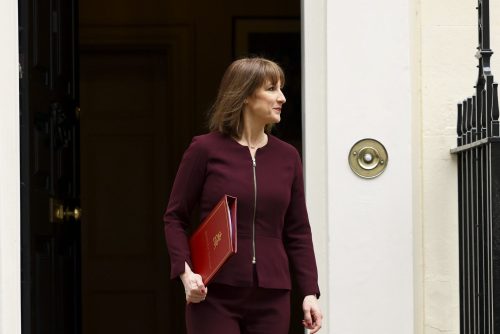Chancellor relies on defence as OBR halves this year’s growth forecast to 1%

Chancellor Rachel Reeves is backing the UK to become a “defence industrial superpower” as she balances the need to drive economic growth in a changing world.
The importance of defence, one of the South West’s largest sectors, was weaved through her Spring Statement, which gave no ground but rarely sought to expand on previous positions.
Defence spending, which had been due to rise £2.9bn next year, will increase by a further £2.2bn, Reeves said, taking it to 2.5% of GDP by 2027.
However the Office for Budget Responsibility (OBR) has cut its forecast from 2% to 1% for the UK economy this year, before upgrades in the rate of growth in the following years.
“The fiscal rules are non-negotiable”, said Reeves today, adding that headroom has been “restored” by today’s measures. The Chancellor blamed “increased global uncertainty” for the OBR originally projecting a deficit.
Well-trailled cuts of £4.8bn to the welfare budget were used to keep Reeves within her self-imposed fiscal rules, which are expected to come under further pressure through this year and might need addressing in the autumn Budget.
Many businesses have been critical of the additional costs from her first Budget last October that will come into effect next week. Reeves is also under pressure from some Labour MPs concerned that she is following a Treasury orthodoxy that mimics an austerity approach.
Reeves highlighted how the Trump-inspired turbulence offers opportunities for the UK to become a “defence industrial superpower” focused on innovation. Defence spending will be increased, with £2.2bn will be provided to the Ministry of Defence, which is being offset by a reduction in international aid.
Reeves has consistently set out that the Treasury would have one “fiscal event” in a year, and the Spring Statement was not designed to be a second Budget.
The Government’s spending review will be completed in June but Reeves brought forward £3bn of investment for public services in a transformation fund, to “make public services more efficient, more productive and more focused on the user”.
Although there were no new tax-raising measures, £1bn is aimed to be raised by further investment in HMRC’s ability to tackle tax evasion.
As home to Europe’s largest naval base – Devonport in Plymouth – as well as the MoD’s Defence Equipment & Support arm at Abbey Wood, Bristol, and the HQ of the UK Hydrographic Office in Taunton, the South West is expected to benefit more than most other regions by the lift in defence spending.
It is already the region with the second highest MoD spending in the UK – £6.9bn a year against £7.9bn in the South East – and is home to most of the country’s largest defence contractors, including BAE Systems, Rolls-Royce and missile systems firm MBDA in Bristol, Babcock in Bristol and Plymouth, Leonardo Helicopters in Yeovil and Avon Technologies in Melksham, Wiltshire.
The defence industry in Cornwall, Devon, Dorset and Somerset alone supports more than 61,000 highly skilled jobs and contributes £2.8bn in GVA to the UK economy, while the east of the region has the largest cluster of aerospace firms in Europe.
The increased in defence spending was welcomed by Sutton and Devonport MP and armed forces minister Luke Pollard, who said it was good news for Plymouth.
“More investment in innovative technologies will help our marine autonomy businesses. And more defence funding means we can get on with the job of fixing the awful state of defence housing,” he said.
Suzy Harris-Milnes, tax partner at BHP said: “The Chancellor of the Exchequer kept her promise to make no major tax announcements during today’s Spring Statement. In fact, there were enough bombshells for business owners in the Autumn Budget, including the increase in NI contributions for employers which comes into effect next week, that businesses need to ensure they’re prepared for in the new tax year.
“However, that being said and linked to the Government’s desire to get more people working, that all businesses should be aware that for apprentices under 25 who are basic tax payers and veterans there are no employer NI contributions.
“With the new tax year starting next week it’s crucial businesses get the right advice to ensure that they are able to not just survive but thrive in what the Chancellor noted as uncertain times.”










